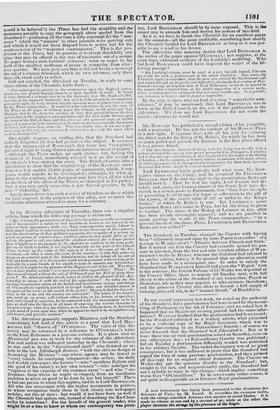In the Morning Advertiser of Thursday, there was a singular
article, from which the following passage is extracted.
"Mr. O'Connell's presentations of himself to the public sic really too frequent and of too extensive a nature to find insertion or notice in our journal iu the order of their appearancei. while our Tory contemporaries merely labour in their stated vocation in endeavouring to turn to the advantage of their pawns, and the disadvantage of their political opponents, the escapades of a person on whom no person of common sense, whatever estimate they might form of his talents for good or evil, ever placed the slightest reliance for a longer period than it might sow the purpose (9.' the Agitator to continue in the same truth. But we do think it foolish, if not highly blameable on the part of the Liberal Press, to take up the cause of this man as if it were the cause of the Go- rernment,—or what is more, the cause of the country ; to take him under its wings as an essential part of the Administration, and to defend all his acts of fully and barbarism, as if the country could not be governed without him, or he were able by a mere breath of his mouth to make or unmake any Administra- tion which it might be the pleasure of his Majesty to call to his aid. Was there ever a more foolish mistake? or a more groundless supposition ! What ! No Government stand without the aid of O'Connell and his Tail of forty-three joints, No Administration stand, unless it shall be the pleasure of his Agi- tutorship to stamp it with the seal of his approbation? No safety for the existing Government unless all the foolish and mischievous sayings and doings of O'Connell are regularly gazetted as Gospel truths, and defended almost at the point of the sword or the mouth of the pistol? Heaven forbid the degrada- tion, so far as we and the country are concerned ! The latter, if we mistake not, could go on pretty well without either him, or his letters, or speeches; and, with regard to ourselves, be he connected with the Government or be he not, we shall take the liberty at all times of exposing the vicious character of his proceedings, when they are vicious, as we have hitherto done, or bestowing a just meed of praise upon him, when he appears to merit it by straightforward, and limiest, and patriotic conduct."
The Advertiser generally supports Ministers, and the Standard immediately laid hold of this article as a proof that Lord MEL- .BOURNE had "thrown off" O'CONNELL. The value of this dis- covery may be estimated by a reference to O'CONNELL'S letter to the Irish Reformers in a previous column. It is plain that no -Ministerial pen was at work for the columns of the Advertiser. The real author was indicated yesterday in the Chronicle ; where 'he was said to be the "discontented spirit" who dictated an ar- ticle in the last Edinburgh Review, " with the obvious design of -destroying the Ministry"—one whose agency may be traced in "every vehicle for conveying information—the review, the daily and weekly newspaper, the lecture"—who "sacrifices Reform and the good of his country to his own interest"—who indulges his "caprices at the expense of the common cause"—and who "un- dermines those whom he ought to support, from an inordinate ambition to allow no good to be done by any but himself." There is but one person to whom this applies, and he is Lord BROUGHAM. All who are conversant with the higher movements in politics, or whose occupation leads them to look closely into newspaper articles, see this at once : but would it not have been as well if the Chronicle had spoken out, instead of describing the Ex-Chan- cellor by inuendoes ? For the benefit of the general reader, who might beat a loss to know at whom our contemporary was point- ing, Lord BROUGHAM should be by name exposed. This is tin surest way to unmask him and destroy his powers of mischief. As it is, we have to thank the Chronicle for an excellent paper on the occasion—all the more creditable, considering how stoutly the Chronicle battled for Lord BROUGHAM as long as it was pos- sible to say a word in his favour. The Advertiser this morning denies that Lord BROUGHAM is the author of the paper against O'CONNELL; but supplies, at the same time, additional evidence of his Lordship's meddling. Who but Lord BROUGHAM could have inspired the writer of the fol- lowing passage?
" His Lordship's talents must be rated at a very low ebb indeed, if he can get credit for such a petformance as the article alluded to. Nay, more, the Chronicle ought to remember, that the mon who carried the Government safe and sound through all its perils and difficulties,thyring the last session if Par- liament—having no help but that of Lord Melbourne—is not to be treated in the manner that it treated him, at the pitiful suggestion of a certain party, when it endeavoured to extinguish him not many months ago. It is possible, nay, mullion, to forgive—but to forget is impossible."
By the way, to those who are fond of noting " remarkable coin- cidences," it may be mentioned, that Lord BROUGHAM was in town, at the Privy Council, on the eve of the publication in the Advertiser. We dare say Lord BROUGHAM did not write the article---of course he would not.


























 Previous page
Previous page